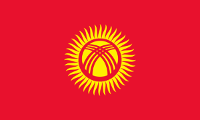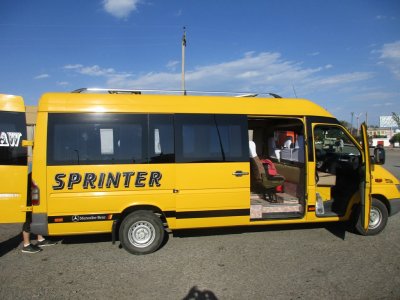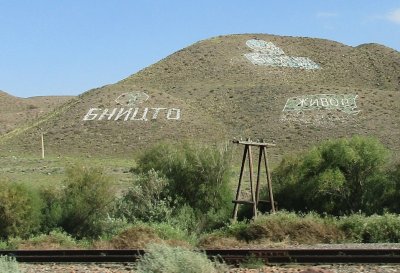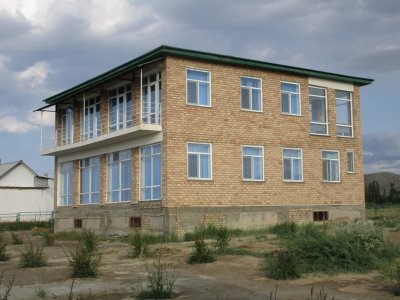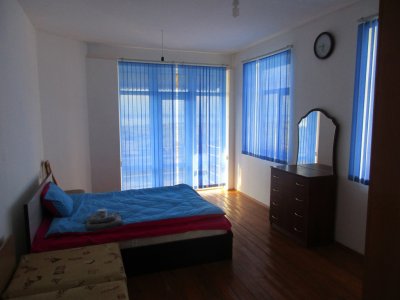The road to Barbulak
At three o'clock we hopped into our trusty Mercedes van to head out of town for a two-night excursion.
It's a longish ride, four hours. Our group is nine of our students, plus two from Texas A&M who came here through SRAS, plus five language coaches, then myself. Additionally there is Ulán, our driver, and Danár, our guide.
We start wending our way through the city, which takes quite a while, and then we finally hit the highway and head northwards a bit. After not too long a time we see the river Чу (Chu) on the north side of the rode, which doesn't look huge here, but is still a respectable river for such an arid place. There is some farmland, irrigated, of course, most of which seems devoted to hay and corn at first. Corn, by the way, became popular as a crop in the Brezhnev era, but it wasn't people food. It was forage for livestock (фура́ж для скота́, корм для скота́). After a decade or two it somehow become popular in the fUSSR to include it in one salad around New Year's, which, IIRC, was made of crab sticks, mayonnaise and corn.
As we proceed onwards, the mountains we pass through are barren and dignified. You know how in the US cities used to put their initial in large white rocks on a hill near the town? So the locals have done it quite a few places here, but instead of town names, they turn out to be advertisments for Живо́е beer or political parties or local turn-offs or ecotourism.
The temperature is in the lower nineties, but ever twenty kilometers or so you can sense a slight difference in the climate, at first due to the Chu and then due to increasing elevation.
It's funny how different and the same things can seem. The farmland looks pretty well the same as you see anwyhere in the US. Much of the countryside has the barren feel of the deserts and scrublands as one heads west towards Yuma along I-8 in Arizona, or along I-10 west of Blythe but before you hit Indio along. Then you get stretches of land like many you would see in the American southwest.
And then every once in a while you get a view of the Ala-Too mountains in the south, rising incredibly high, some peaks of which are still covered with snow even though it's July. Then you know you aren't in Arizona anymore.
Finally I see a sliver of blue. It's the western edge of Lake Issyk Kul, the second largest mountain lake in the world after Titicaca. We finally arrive at our boarding house, which is called Barbulak Hostel. It turns out to be much nicer than I had expected. '
It's a two-story affair, clean, decent showers and toilets. We do not occupy room four, just in case there are bedbugs. The main building is located in a fenced yard. To the east of the fence is the home of the mother and daughter (and presumably father) who take care of the place. In the west part of the yard is a two-story building which houses the kitchen and dining room on the first floor. I'm not sure at all what is on the second floor there. The rest of the yard is planted with apricot saplings, a tree that produces wonderful fruit in this part of the country and from which they make урю́к (urúk), dried apricots.
My room is on the second-floor and vastly nicer than I had expected. It's nicer than my apartment in Bishkek, and God knows the bed is much more comfortable than my sofa-bed.
Our evening meal is a chicken and vegetable dish, along with a plov that has some scant mutton in it. As with all Kyrgyz meals there is hot tea, bread, an option for 3-in-1 coffee (instant coffee with sugar and milk powder). There is also борсо́к (borsók), small bits of fried bread covered in honey. The food is actually quite a bit better than I was expected, and it's home-cooked by the mother and daughter.
There is some daylight left, so most of take the 10-15 minute walk to the beach. The sun is near to setting. We are warned the water may be too cold. Alas, youngsters can be so timorous! But there is no way in hell that I am going to cross half the planet and fail to swim in the lake; it is a once in a lifetime opportunity. The glorious group leader heads straight into the water.
The water is indeed a bit chilly, but having seen the way paved by yours truly, student Jared follows briefly after. (Jared will usually be the first to do everything on the trip. He is always at the head of a hiking group, always going for the highest peak and most distant view. Not only is he athletic, but he is actually really sharp, too. I've been impressed with him when I have observed the third-year class. His grammar teacher says he has almost no accent.)
Alas, the submerged shoreline is really rocky and irregular. You have to proceed quite cautiously. Water-shoes would really help. Nonetheless, with Jared and me out there, many of the rest of our students come in as well. Alas, the language coaches are all timid.
The wind has whipped up. I leave the water, and the wind dries me. The language coaches are incredulous; “Aren't you cold, Don?” Nope. It feels pretty good. And for the first time since I have arrived in Kyrgyzstan, I feel happy.
Soon the rest are out of the water, and we head back to the boarding house. Most of the language coaches are staying in my part of the building, as is student Patrick. Before bedtime I spend some time with them downstairs. I'm on the floor stretching out. Haven't done yoga forever. The stretching feels amazing. And the youngsters are astonished that I can do pincha mayurasana (forearm stand), an arm balance with legs intertwined to the right, and of course a handstand. If you are a yogi out there, then let me say these kids were easily impressed. The poses were pathetic.
They mentioned they wanted to dance. Damn. That means they will make noise half the night, and I really want to sleep. But the language coaches will involve our students in their noise, so I depart with, "It's time for the old man to go to bed. Don't worry about making noise. I won't mind." Normally that wouldn't be true: I like my peace and quiet. But this time I decide ahead of time to view it differently. The hours wear on, and I hear the happy sounds of fledgling Russian percolate up to my bedroom; It was a good decision. Plus they pretty well call it quits by midnight since they know we have to be up at 7:30 in the morning, which is inordinately early by Russian/Kyrgyz standards. So I actually get a full six hours of sleep.
In the middle of the night I wake up. I briefly open the window, which somehow the mosquitoes don't notice. There are almost no bright lights hear, so the stars are bright, and I see many faint stars I haven't seen in many years. Cassiopeia crowns the view. It's quiet here. Quieter than anything I have experienced in the long time. I return to sleep.
No feedback yet
Form is loading...

